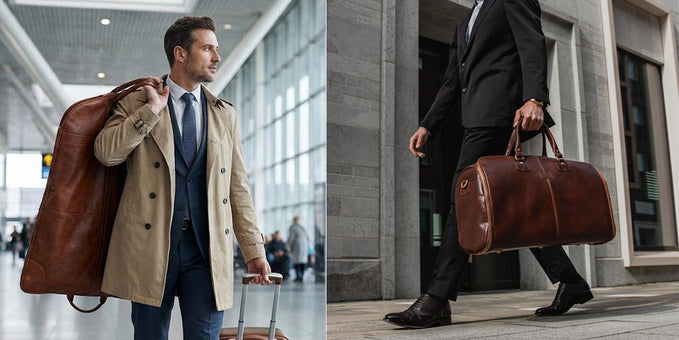What is a Wallet?

As of 2026, "wallet" can mean two things:
- Traditional 'physical' wallet - used to carry your cards and cash (most common)
- Digital wallet - electronic wallets stored in the cloud, designed to hold information on financial transactions, cryptocurrency and passwords.
What is a Traditional Wallet?

Traditional wallets are flat cases or pouches.
They are regularly used to transport small items like bank notes, credit cards and debit cards as well as ID cards, driving licenses, and business cards.
They tend to be made from leather or fabric and tend to be pocket-sized and foldable.
At Von Baer, we only use the finest leather in our wallets, to ensure they look great for many years.
Wallets can include coin purses, money clips, chain fasteners, zippers, reins, snaps, or straps.
Specialized wallets for holding things like passports and checkbooks are available, as are some distinctive wallets that can be worn on wrists or even shoes.
Wallets can also be used as fashion accessories and can make statements about someone’s sense of style, wealth, or social status.
What is a Digital Wallet?

Digital wallets are also known as electronic wallets.
They are financial transaction apps that run on devices like smartphones and computers.
They store your sensitive payment information and passwords in the cloud.
When you have access to a digital wallet, you can pay with your device, so you don’t need to use your card or carry it around.
Once you’ve entered and stored your information, you can use your device to pay for products and services.
Digital wallets can also store membership cards, gift cards, loyalty cards, coupons, plane tickets, concert tickets, ID cards, hotel reservations, and even car keys.
Which types of wallets are available?
Physical wallets
Classic bifold and trifold wallets

These traditional formats give you a great blend of accessibility and space.
They are designed to carry cards, cash and identification in a compact form which makes them perfect for day-to-day use.
A bifold wallet opens up into two interior sides to store cards, whereas a trifold wallet opens up into three interior sides.
The image above is of this leather bifold wallet.
Money clips

Money clips are ideal for people who prefer minimalism. They allow you to carry cards and cash in a sleek manner and tend to be made from metal.
Money clip wallets have a metal clip in the centre of the fold, allowing you to have your cash easily available, while benefiting from the other compartments of a wallet.
The image above is of this leather money clip wallet.
Cardholders

Cardholders have become increasingly popular in a society that is relying less and less on physical cash. They are slim and designed mainly for cards.
The image above is of this leather card holder.
Women’s purses and clutches

These are fashion statements as well as wallets. They can include elegant clutches for formal scenarios and practical purses for daily usage.
The image above is of this leather clutch.
Breast wallet

This option is also known as a “secretary wallet”. Banknotes aren’t folded when placed in these wallets.
They are intended to be housed in men’s breast jacket pockets and handbags.
They are often used to hold checks as well as other large financial documents.
Front pocket wallet

Front pocket wallets are very similar to bifold/trifold wallets, but they have a compartment on the very front, designed for quick access to your most used cards.
Long wallets
These larger wallets are often worn with jeans and fastened by leather bands, straps or chains. Bills are held flat. Long wallets normally have a coin purse.
Wallet bands
This type of wallet has a continuous elastic band made of fabric or rubber to secure cards and/or cash. Wallet bands are great for those who wish to avoid the bulk associated with traditional wallets.
Wristlets
These are wallets which you can secure to your wrist to keep your hands free.
Travel wallets

Travel wallets are used by travelers to hold documents like boarding passes, tickets, passports, travel insurance documents, checks, foreign currency, hotel booking information and more.
The image above is of this leather travel wallet.
ID case/neck pouch
These are thin leather or nylon cases that come with plastic see-through compartments that are designed to hold ID cards.
They tend to be worn around the neck and have additional pockets for holding smaller items which means they can also work as wallets.
Shoewallets
These are small pouches that are attached to shoes to be used as wallets.
They are mainly designed to be worn during exercise.
Hardware wallet
A cryptocurrency wallet that’s built as a separate physical device that identifies the owners and enables them to sign online transactions securely.
Side by side wallet
This wallet divides contents into two stacks rather than one. The wallets are often manufactured from very thin fabric.
L-zip wallet
This is a rectangular-shaped wallet with a zipper which runs along two of its sides.
Metal wallet
A slim kind of wallet that’s manufactured from metal. These can include titanium or aluminum.
Other materials are often combined with the metal such as leather and wood.
Credit card holder

This is a rectangular shaped wallet that’s designed to hold credit cards.
The image is of this leather card holder.
Cardholder zip wallet
A rectangular shaped wallet that has a zipper for coins and a credit card holder.
Checkbook
This is a wallet used to hold standard-sized cheques.
Envelope
A long wallet with features similar to an envelope that comes with a covering flap.
Automatic wallet
A wallet with a mechanism which ejects inserted cards with a button so they can be displayed and used. Other names include cascading wallets and pop-up wallets.
Tactical wallets
A functional wallet used to store small saws, rulers, knives, bottle openers and other tools. It’s often compared to a Swiss army knife.
RFID blocking wallet
These wallets act as a Faraday cage around proximity-sensing enabled cards. They can block NFC and RFID signals to prevent portable RFID readers from being able to read sensitive data.
Digital wallets
Cryptocurrency wallets

Cryptocurrency wallets have grown in popularity as digital currencies including Bitcoin have become more popular.
They are used to securely store digital keys needed to both access and transact cryptocurrencies.
Mobile payment systems
These include Apple Pay and Google Wallet.
They turn your smartphone into a digital wallet so you can make contactless payments and are highly regarded for their convenience, security and the way they are accepted around the world.
Online payment systems
Online payment systems like Venmo and PayPal take the stress and strain out of online transactions.
They are platforms for both sending and receiving funds, paying for services and shopping online without having to use cash or physical cards.
Materials and design
Materials

The material of a wallet can define its quality.
Leather is a traditional option noted for its elegance and durability as well as the way it ages beautifully over time.
Von Baer are known for manufacturing high quality leather wallets for men and for women.
Canvas is ideal for those seeking a casual look and feel, whilst metals provide minimalist durability.
Design matters
When it comes to wallets, great design means striking the right balance between practicality and aesthetics.
Well-designed wallets offer the capacity you need alongside comfort, protection and ease of access.
Customization and personalization
There are many ways to customize a wallet to ensure it meets your needs. Features like embossed initials and customizable interfaces on a digital wallet enable you to make a big statement about your personality and visual preferences.
Functionality and features
Modern wallets don’t just offer storage. They often come with features like biometric locks and RFID blocking to blend convenience with security.
Digital wallets use advanced encryption to secure your data to ensure they’re not merely a tool for making payments.
Digital wallet technology
Digital wallets use sophisticated technology to ensure your transactions are safe and seamless regardless of which platforms or currencies you’re using.
Cultural and fashion aspects
Wallets aren’t just functional. They are fashion statements which reflect cultural trends and personal preferences. They enable you to tell a real story about who you are.
Economic and environmental impact
The wallet that you choose doesn’t just impact your pocket. It’s also about your environmental footprint and ethical production. The growing popularity of digital wallets has shown a sizeable shift in economic behaviors.
The future of wallets
Shifts in technology and society are largely to have a big influence on the future of wallets. The wallet's role has been changing as we move further towards a cashless society.
Your wallet isn’t just a place to store cash. It reflects your lifestyle, guards your personal items, and enables you to keep up with evolving technologies and fashions.
Related pages:
- Types of Wallets
- History of the Wallet
- Clean leather wallet & remove stains/smells
- How are leather wallets made?
- How To Choose a Quality Leather Wallet
- How to Put Money in a Trifold Wallet
- Best Leather for Wallets
- Leather Patina on Wallets
- How To Dry a Leather Wallet
Final Thoughts
Choose the right wallet and receive your faithful companion for each journey and transaction you make.
We hope you enjoyed our article, if you have any questions or comments, contact us at info@vonbaer.com, or leave them in the comments.

Author: Albert Varkki
Albert Varkki is the co-founder of Von Baer. He understands leather products as a consumer, supplier, and a manufacturer, helping you with the inside knowledge you need, to choose the perfect leather product for you.
We strive for the highest editorial standards, and to only publish accurate information on our website.
Leave a Comment
Your email address will not be published.






